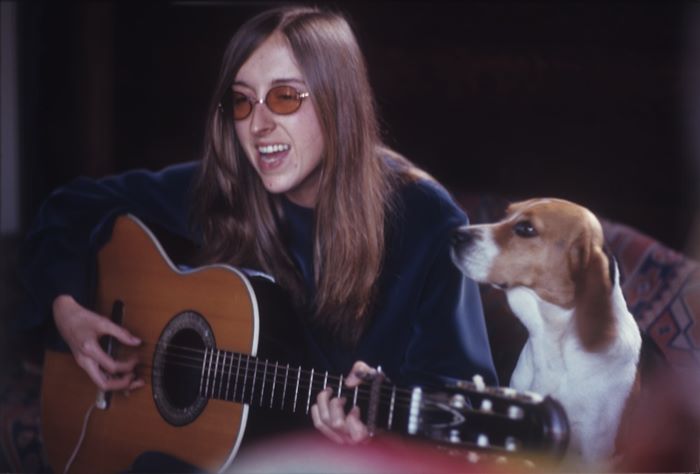Jackson Browne, Linda Ronstadt, Graham Nash, Joni Mitchell, Judee Sill: Which one doesn’t seem to belong? All were performing folk-oriented rock music in the early 1970s, and all did extraordinarily well. All except for Judee Sill. Sill was the first artist signed by David Geffen’s first label Asylum Records, home of the Eagles. In fact, the above-named colleagues were enraptured by her. Nash more than intimates that she was far more talented than he was. Artists have egos, and when they put theirs aside to extoll the virtues of a colleague that is saying something. So, what went wrong? Why isn’t Judee Sill more well known today? This is the question that Lost Angel: The Genius of Judee Sill sets out to answer.
In many ways, the biographical documentary follows a conventional route, with talking heads and a chronological timeline. However, it turns out that Sill was also a talented illustrator, so the directors—Andy Brown, Brian Lindstrom—animate and expand her illustrations, giving the feature a unique feel. They also were lucky enough to have audio from a rare and lengthy interview with Sill, who passed away in 1979. (She talks a mile a minute and jumps from topic to topic as if her brain simply can’t contain her ideas.) They also have an actress replicate Sills’s distinctive tone and delivery in readings from her diaries, which reflects Sill’s particular view of and immersion in the time and climate that she was most active.
Her biography is a humdinger. Born the daughter of a barkeeper who she adored and who died when she was five, she had to endure abuse from her stepfather, an illustrator on the “Tom and Jerry” animated shorts. She left home at 16 after her mother died and started robbing banks for the thrill of it. Caught, she was sent to reform school, where she became the church pianist. Here is where she says her style coalesced and she learned “all the cool gospel licks.” Released and broke, Sill fell into drugs and prostitution. This is all before she recorded a note. Then she walked into a jazz club and became obsessed with the bass player. She, in her own words, “married him to figure out his music.” They played together and did drugs together. There was a falling out, and Sill got clean and started playing clubs.
To say that Judee Sill was not an easy person is an understatement. “Rough around the edges,” “didn’t play the game well” are how her friends describe her. But her music, to them, was sublime. She started playing live at various clubs around Los Angeles, and was impressive enough to score a record deal with Asylum Records. Her first single was produced by Nash. She dated J.D. Souther, and she fell headfirst into the California singer-songwriter scene.
What sets her apart is her music and her drive. Interestingly, Still had a somewhat spiritual and altruistic take on her ambition. She claimed she “was on a mission to waken the masses” and hated opening for rock artists, not because she felt she deserved to be a headliner (though she did), but because the audience “wanted to boogie on a lower level.”
And the music is good, really good, denser than the work that was coming out of Southern California at the time. It feels alternately simple and baroque, which makes sense as Sill cited Bach as a major influence. It still sounds very early ’70s, but it easy to see why a more recent generation of musicians has discovered and have proselytized her music. The film features the Fleet Foxes covering one of her songs live and interviews with members of the band Big Thief.
Ultimately, and not expectedly, Sill’s life takes a sad turn, and directors Brown and Lindstrom do not shy away from this nor do they exploit it. They treat Sill with utmost respect and sympathy. She was a unique artist, deeply ambitious and self-assured who was competing in a business that was stacked against her. Geffen claims she was given the same shot as everyone else, but he dropped her after Sill, who felt she wasn’t being promoted well, insulted him on stage. And Souther underlines the sexism inherent in the recording industry by stating the fact that her not “being as attractive” as other performers absolutely hindered her career.
Lost Angels is a sympathetic and arresting portrait of a unique artist who is due for another look.







Leave A Comment